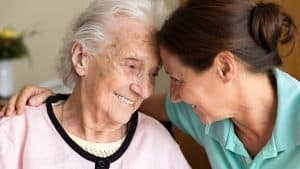
Maria and Arthur are coming towards the end of their lives. They are a couple I know, who raised four children, had vibrant and dynamic careers at the prime of their lives, lived in different countries and made a very positive and significant contribution to the world in various ways.
Now, in their mid-80s, their health is failing them in different ways. Maria has been diagnosed with a muscle-wasting disease, and Arthur has had a stroke, and while still at home, is highly dependent on carers for all his basic functions.
Their children are rallying around, visiting more often, aware that they don’t know how much longer their parents will be alive, and wanting to help in any way they can.
Maria and Arthur’s world is closing in on them. Where before they would have been interested even in just walking to the local shops for the daily paper, now their perambulations take place in shuffling around the garden.
For those close to them, this can seem to be terrible, a world that is getting smaller and smaller. But both Maria and Arthur are okay with this.
If you’re in this position with your parents or loved ones, here are 3 tips to help you be with them graciously at this period of their lives.
Maintain a Tender Balance Between Living and Dying
The moment of death is just that – a moment. In fact, if we are with the person as they pass over, we do not necessarily know exactly when that moment is.
If we are with someone as they die, it is only when it dawns on us that the next breath is not coming that they have actually died. Up until that point, the person is alive. Maybe not alive and kicking, but still alive, and thus needs to be treated as such.
For caregivers, friends and family members, the period of a limited life up until death itself can be quite a challenge. Accepting that the loved one’s world has grown smaller can be difficult.
By all means, take your parents out or support them in whatever they want to do, but don’t take it personally if it all feels like too much of an effort for them and they just decline any suggestions.
Unless depression has taken hold, in which case professional advice might be appropriate, take the lead from them and walk the tightrope between being alive and being dead in as sensitive a manner as you can.
Become Comfortable with the Uncertainty
As caregivers, friends or family of those coming to the end of their lives, we never know when a phone call might interrupt what we had planned. We never know when circumstances might dictate the need for research into other ways of providing care.
At any moment, the frail elderly loved one might fall and break a bone, become ill with a cold that can’t be shaken off, or discover a new diagnosis that brings the end nearer.
If we can’t cope well with this uncertainty, then worry and anxiety take hold.
We all know that it’s no good worrying about anyone, but in the wee small hours, when the world is dark and quiet, and everyone else is asleep, it is fertile ground for our thoughts which run away with themselves into a land of future projections, fears and concerns always beginning with ‘What if?’
Instead of this, we need to learn to live with the uncertainty; to stop playing the game the whole human race plays, of pretending we know what is going to happen.
When we acknowledge that, we can then turn to the present moment, bring mindfulness to bear, and once again, accept what is here rather than what isn’t. This is a practice that requires practice, but with that, becomes easier and easier.
Show Patience
Maria finds herself apologizing to her daughter – “I’m so slow these days, everything takes so much longer.” Her daughter is reminded of when her children were young, and she had to allow half an hour of preparation before they went anywhere.
Now, she notes that while it would be much easier and quicker to do things for her mother and father, she needs to bring patience to bear.
She needs to allow them the time to continue doing what they can do rather than – under the guise of being helpful – take away from them the ability to care for themselves.
Hence stacking the dishwasher, making a cup of tea, or watering the plants may take much longer, but it is important that these daily tasks are done while the aging person can still do them. There is a fine line to tread between ‘taking care of’ and ‘taking over.’
Take Care of the Administration Beforehand
Overall, after someone dies it is much easier to deal with the administrative aspects of their life if they have been discussed in advance of that death, sometimes years in advance.
That’s the purpose behind my forthcoming book, Before I Go: The Essential Guide to Creating A Good End of Life Plan.
It is meant to inform, encourage and inspire people to understand the importance of having thought through the myriad of questions that need to be attended to; and then to have discussed and written down what is ideally wanted in their end-of-life plan.
If you’re in this situation with dying loved ones, do you know what they want after they have died? Do you know the details of any kind of celebration they want?
Do you know what is important to them at this time, how they want to be remembered, what are their accounts’ passwords? If you answer no to these questions, do you dare to ask them? I challenge you to do so.
Do you have any suggestions on how to have a positive conversation with a dying loved one? Have you shared your own end-of-life plan with those you love? Please share your wisdom on making this conversation as easy as possible.





